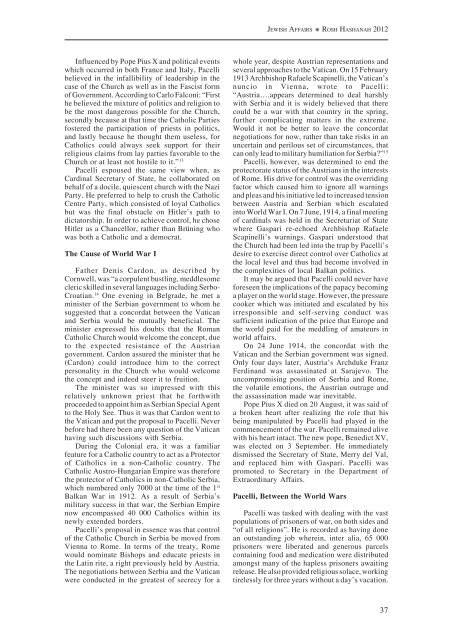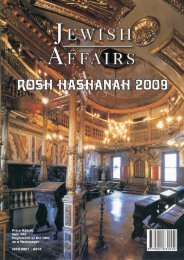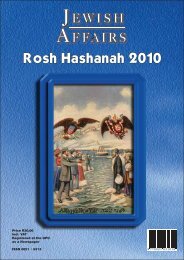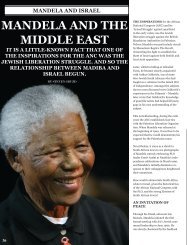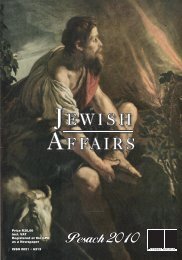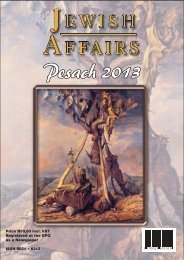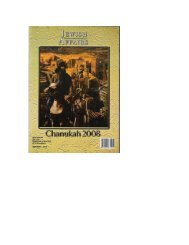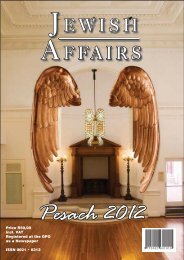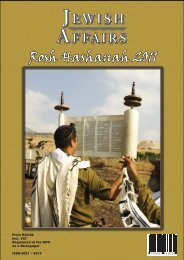Jewish Affairs - South African Jewish Board of Deputies
Jewish Affairs - South African Jewish Board of Deputies
Jewish Affairs - South African Jewish Board of Deputies
- No tags were found...
Create successful ePaper yourself
Turn your PDF publications into a flip-book with our unique Google optimized e-Paper software.
JEWISH AFFAIRS ROSH HASHANAH 2012Influenced by Pope Pius X and political eventswhich occurred in both France and Italy, Pacellibelieved in the infallibility <strong>of</strong> leadership in thecase <strong>of</strong> the Church as well as in the Fascist form<strong>of</strong> Government. According to Carlo Falconi: “Firsthe believed the mixture <strong>of</strong> politics and religion tobe the most dangerous possible for the Church,secondly because at that time the Catholic Partiesfostered the participation <strong>of</strong> priests in politics,and lastly because he thought them useless, forCatholics could always seek support for theirreligious claims from lay parties favorable to theChurch or at least not hostile to it.” 13Pacelli espoused the same view when, asCardinal Secretary <strong>of</strong> State, he collaborated onbehalf <strong>of</strong> a docile, quiescent church with the NaziParty. He preferred to help to crush the CatholicCentre Party, which consisted <strong>of</strong> loyal Catholicsbut was the final obstacle on Hitler’s path todictatorship. In order to achieve control, he choseHitler as a Chancellor, rather than Brüning whowas both a Catholic and a democrat.The Cause <strong>of</strong> World War IFather Denis Cardon, as described byCornwell, was “a corpulent bustling, meddlesomecleric skilled in several languages including Serbo-Croatian. 14 One evening in Belgrade, he met aminister <strong>of</strong> the Serbian government to whom hesuggested that a concordat between the Vaticanand Serbia would be mutually beneficial. Theminister expressed his doubts that the RomanCatholic Church would welcome the concept, dueto the expected resistance <strong>of</strong> the Austriangovernment. Cardon assured the minister that he(Cardon) could introduce him to the correctpersonality in the Church who would welcomethe concept and indeed steer it to fruition.The minister was so impressed with thisrelatively unknown priest that he forthwithproceeded to appoint him as Serbian Special Agentto the Holy See. Thus it was that Cardon went tothe Vatican and put the proposal to Pacelli. Neverbefore had there been any question <strong>of</strong> the Vaticanhaving such discussions with Serbia.During the Colonial era, it was a familiarfeature for a Catholic country to act as a Protector<strong>of</strong> Catholics in a non-Catholic country. TheCatholic Austro-Hungarian Empire was thereforethe protector <strong>of</strong> Catholics in non-Catholic Serbia,which numbered only 7000 at the time <strong>of</strong> the 1 stBalkan War in 1912. As a result <strong>of</strong> Serbia’smilitary success in that war, the Serbian Empirenow encompassed 40 000 Catholics within itsnewly extended borders.Pacelli’s proposal in essence was that control<strong>of</strong> the Catholic Church in Serbia be moved fromVienna to Rome. In terms <strong>of</strong> the treaty, Romewould nominate Bishops and educate priests inthe Latin rite, a right previously held by Austria.The negotiations between Serbia and the Vaticanwere conducted in the greatest <strong>of</strong> secrecy for awhole year, despite Austrian representations andseveral approaches to the Vatican. On 15 February1913 Archbishop Rafaele Scapinelli, the Vatican’snuncio in Vienna, wrote to Pacelli:“Austria….appears determined to deal harshlywith Serbia and it is widely believed that therecould be a war with that country in the spring,further complicating matters in the extreme.Would it not be better to leave the concordatnegotiations for now, rather than take risks in anuncertain and perilous set <strong>of</strong> circumstances, thatcan only lead to military humiliation for Serbia?” 15Pacelli, however, was determined to end theprotectorate status <strong>of</strong> the Austrians in the interests<strong>of</strong> Rome. His drive for control was the overridingfactor which caused him to ignore all warningsand pleas and his initiative led to increased tensionbetween Austria and Serbian which escalatedinto World War I. On 7 June, 1914, a final meeting<strong>of</strong> cardinals was held in the Secretariat <strong>of</strong> Statewhere Gaspari re-echoed Archbishop RafaeleScapinelli’s warnings. Gaspari understood thatthe Church had been led into the trap by Pacelli’sdesire to exercise direct control over Catholics atthe local level and thus had become involved inthe complexities <strong>of</strong> local Balkan politics.It may be argued that Pacelli could never haveforeseen the implications <strong>of</strong> the papacy becominga player on the world stage. However, the pressurecooker which was initiated and escalated by hisirresponsible and self-serving conduct wassufficient indication <strong>of</strong> the price that Europe andthe world paid for the meddling <strong>of</strong> amateurs inworld affairs.On 24 June 1914, the concordat with theVatican and the Serbian government was signed.Only four days later, Austria’s Archduke FranzFerdinand was assassinated at Sarajevo. Theuncompromising position <strong>of</strong> Serbia and Rome,the volatile emotions, the Austrian outrage andthe assassination made war inevitable.Pope Pius X died on 20 August, it was said <strong>of</strong>a broken heart after realizing the role that hisbeing manipulated by Pacelli had played in thecommencement <strong>of</strong> the war. Pacelli remained alivewith his heart intact. The new pope, Benedict XV,was elected on 3 September. He immediatelydismissed the Secretary <strong>of</strong> State, Merry del Val,and replaced him with Gaspari. Pacelli waspromoted to Secretary in the Department <strong>of</strong>Extraordinary <strong>Affairs</strong>.Pacelli, Between the World WarsPacelli was tasked with dealing with the vastpopulations <strong>of</strong> prisoners <strong>of</strong> war, on both sides and“<strong>of</strong> all religions”. He is recorded as having donean outstanding job wherein, inter alia, 65 000prisoners were liberated and generous parcelscontaining food and medication were distributedamongst many <strong>of</strong> the hapless prisoners awaitingrelease. He also provided religious solace, workingtirelessly for three years without a day’s vacation.37


